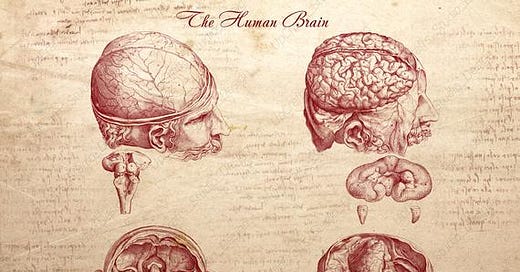Leonard da Vinci was a terribly inefficient painter. His career was littered with abandoned commissions and projects that overran by decades, many never finished.
Yet, 500 years later, here I am writing a newsletter about him. He must have done something right.
Welcome new readers! If you’re reading this but haven’t subscribed you can subscribe here:
Obsessed
Today we’re obsessed with efficiency. Send a Management Consultant into Leo’s 16th century studio and they’d have a field day.
Ten paintings in progress! No, that won’t do.
Let’s pause all but the most lucrative and work around the clock until that’s delivered, and then on to the next one.
And what on earth is all this time spent dissecting brains?? I’m afraid I can’t justify the ROI. That will have to go.
What then? Commission’s might start being delivered on schedule, and no doubt the great man would finish more paintings. But would I be writing about him on this sunny morning? I suspect not.
On Thinking
Efficiency is wildly overrated. What really matters is effectiveness.
Efficient is optimising your day to get more done. Effective is doing the only thing that really matters. The problem with efficient is it doesn’t leave room for the magic to happen.
We have two ways of problem solving: Via focused thinking or via diffuse thinking. Focused thinking, as you might guess, is giving a problem your full attention. Diffuse is the opposite- it happens in the background. Has the solution to a problem ever occurred to you on a long walk, seemingly out of nowhere? That’s diffuse thinking at work.
We need both to get anywhere in life: The initial focus to understand a problem, and then the subconscious processing to generate an elegant solution. Efficiency kills diffuse thinking. There’s nothing efficient about a long meandering walking or a free afternoon in the calendar. In this day and age our days are packed with calls, and any time spare is spent mindlessly scrolling on our phones. We no longer leave time for our minds to wander.
The Intangibles
We started at a co-working space this week- it’s been life changing. (ARC Club in Homerton, do drop by if you’re in the area)
No doubt WFH is more efficient- there’s far less distraction, no commuting, lunch can be eaten in minutes. But what’s the cost? What you miss is the intangibles. The office small talk, random observations, face to face conversations. However often Ben & I spoke whilst working from home it never came close to an hour sitting across the table from each other.
This week we had our first hire start as Head of Operations. That makes us three, plus the same again in partners. So much of being effective is now keeping everyone on the same page. We could all go away, get our heads down, and churn out work- and of course, this helps to a point- but it’s the lunches and the off hand comments that really make the difference. That’s how we get to understand each other and the problems we’re working on.
Like Leo in his studio, it’s the hours spent seemingly wasting time. He spent years procrastinating on a fabulous range of interests- filling notebooks with everything from diagrams of how water flows, to detailed dissections of the human skull. His insights were centuries ahead of his time.
Nobody could paint quite like Leonardo da Vinci because no one had his depth of understanding of what he was painting. Take the Mona Lisa- da Vinci knew every single muscle below the skin in her cheeks, he knew how the fabric of her dress flowed, how her hair cascaded. And he knew the relationship between light and shadows perhaps better than anyone else on earth. The result is history’s most famous painting.
He might not have been the most efficient painter but my God was he effective.
My Week in Books📚
In Defence of Food by Michael Pollan
“Eat food. Mostly plants. Not too much.” simple. Michael Pollan was well ahead of the game with this book. A pleasure to read.
Why the Germans Do it Better by John Kampfner
I have always wondered. What really stands out is how they own their mistakes of the past like no one else. The horrors of the Second World War are drilled into their school children so nothing similar could ever happen again. I don’t remember learning about any of the British’s shortcomings at school.
I’ll be updating the books I’ve read this year here. Any recommendations? Let me know!
A Final Thought 💡
“Everywhere is within walking distance if you have the time.”
- Steven Wright






“ I don’t remember learning about any of the British’s shortcomings at school. “ SAME! I grew up in South Africa and we were raised as if part of a mini British Empire cult 😶